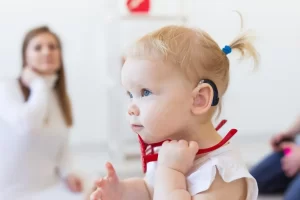
We know that hearing loss can happen in adulthood after years of prolonged exposure to loud noises, but many parents don’t know that hearing loss can be a problem in childhood. If you don’t know what to look for, it can be tough to know if your child is experiencing hearing problems. Early hearing loss can cause lifelong issues with speech and language development. Support your little one’s ears by learning the signs of hearing loss.
Signs of Childhood Hearing Loss
How do you know if your child has hearing loss? One way to identify a potential hearing issue is by noticing how often they ask for clarification or repeat themselves. Another sign may be difficulty with language-based tasks like reading, writing, understanding speech in noisy environments, or following directions. Difficulty with these tasks could be due to other factors, but they can also be a sign that your child needs testing for auditory processing disorder or some other type of hearing problem. A third indicator would be persistent ear infections.
Hearing Screening
If you recognize any of these signs in your children, you should take them in for a hearing screening. The test is not painful and babies can even sleep during the test. While babies are typically screened before they leave the hospital after birth, it is important that you as a parent ensure you get your children scheduled for regular hearing tests as they age. If your child does not pass a hearing screening, they will need to have a full test, or an audiology evaluation. The audiologist will perform tests to determine if there is hearing loss, how severe it is, and what type it is. It is important that you schedule a hearing screening immediately if you suspect hearing loss. Prolonged hearing loss without treatment in childhood can lead to developmental delays in speech and social skills.
Hearing Loss Treatment
As a parent, it is your job to give your children the tools they need to succeed. Your audiologist will recommend treatment and early intervention methods to help your child adjust to hearing loss and overcome developmental challenges. Early intervention has a great impact on childhood development. Aside from other special education programs and other early intervention methods, a child may get hearing aids to make the most of what hearing they do have left (residual hearing). Options include hearing aids, cochlear implants, bone-anchored hearing aids, and other assistive devices. Surgery may be an option if your child has conductive hearing loss or hearing loss due to parts of the ear not working as they should.
To find early hearing detection in intervention resources in your area, visit: http://www.infanthearing.org/status/cnhs.php. Or, contact Amdahl Hearing for a hearing screening and hearing test.